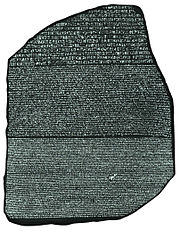
The Rosetta Stone is a fragment of an Ancient Egyptian granodiorite stele, the engraved text of which provided the key to the modern understanding of Egyptian hieroglyphs. The inscription records a decree that was issued at Memphis in 196 BC on behalf of King Ptolemy V. The decree appears in three texts: the upper one is in ancient Egyptian hieroglyphs, the middle one in Egyptian demotic script, and the lower text in ancient Greek.
Originally displayed within a temple, the stele was probably moved during the early Christian or medieval period, and eventually used as building material in the construction of a fort at the town of Rashid (Rosetta) in the Nile Delta. It was rediscovered there in 1799 by a soldier of the French expedition to Egypt. As the first ancient bilingual text recovered in modern times, the Rosetta Stone was the essential key to modern understanding of ancient Egyptian literature and civilization. The decipherment of the Egyptian texts was announced by Jean-François Champollion in Paris in 1822. Today, it is the most-visited object in the British Museum.